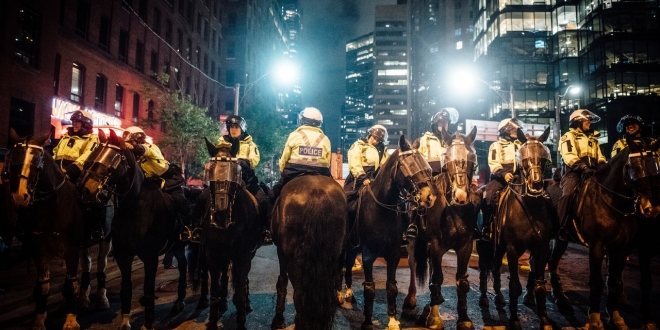Unite’s Assistant General Secretary says the new Police, Crime, Sentencing and Courts Bill is “simply unacceptable” as activists continue to protests to delay the bill passing into law.
Over the past few weeks, thousands of demonstrators have gathered around the country to protest a sweeping crime bill that imposes stricter restrictions on the right to protest.
The new Police, Crime, Sentencing and Courts (PCSC) Bill will introduce new police powers and review the rules around crime and justice across England and Wales. The bill proposes wide-ranging new police powers in relation to protests, such as the ability to impose “conditions” on any protest deemed to be disruptive to the local community and up to 10 years in prison for damaging statues and other memorials.
Protests have sprung up across the country in opposition to the Bill, with the conditions imposed on protests widely interpreted as restrictions on people’s right to protest – such as imposing start and finish times on protests.
In the past few weeks, protests in London, Sheffield, Birmingham, Liverpool, Newcastle, Luton, Weymouth, Bournemouth, Bristol and elsewhere have been held to attract attention to the Bill and the limitations it threatens to impose. Opponents to the Bill say its vague wording could mean it is used to stop all protests and forms of dissent.
In Bristol, early gatherings ended in violence between police and protestors. More than 1,000 people attended a third protest – after Covid-19 lockdown rules changed to make an exception for outdoor demonstrations – forcing the closure of part of the M32 motorway. Seven people were arrested.
More than 100 people were arrested in a London demonstration on Saturday April 3, police said, mostly for offences such as breach of the peace and assault on police or violating lockdown restrictions.
The Bill was expected to go to the committee stage in the week after it passed its second reading, a week filled with protests across the country. Days after the vote, however, the parliamentary website stated it was not expected back in the House of Commons until June 24.
Howard Beckett, Unite Assistant General Secretary said the Bill in its current form is “unacceptable” and called on citizens to reject the Bill, whether it is eventually passed or not.
“We must be very clear in our message to people that this legislation is simply unacceptable,” said Mr Beckett.
“We will not have a society where our rights to protest are taken away. We need to come together now to reject this legislation whether or not it is passed. At the end of the day, opposition to this bill is liberty itself.”
The Police, Crime, Sentencing and Court Bill is a 300-page piece of legislation that is designed to give the police more power, including imposing more restrictions on protests. The law currently states that the police must determine if a protest is likely to lead to serious public disorder or disruption before they are granted the power to step in and break it up.
If the new Bill were to be passed, police would be empowered to place more restrictions on protests – including a start and finish time and noise limits – which would also apply to single-person protests.






Facebook Comments